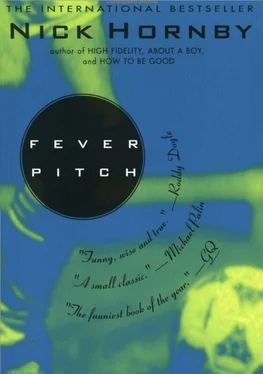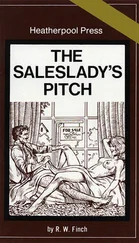My pre-match nerves were the same however meaningless the game. That season Arsenal had blown all chance of the Championship by about November, a little later than usual; but this meant that in the wider scheme of things it scarcely mattered whether they won the games I went to see. It mattered desperately to me, however. In these early stages, my relationship with Arsenal was of an entirely personal nature: the team only existed when I was in the stadium (I can’t remember feeling especially devastated by their poor results away from home). As far as I was concerned, if they won the games I saw 5-0, and lost the rest 10-0, that would have been a good season, probably to be commemorated by the team travelling down the M4 to see me on an open-topped bus.
I made an exception for the FA Cup-ties; these I wanted Arsenal to win despite my absence, but we got knocked out 1-0 at West Brom. (I had been forced to go to bed before the result came through—the tie was played on a Wednesday night—and my mother wrote the score down on a piece of paper and attached it to my bookcase ready for me to look at in the morning. I looked long and hard: I felt betrayed by what she had written. If she loved me, then surely she could have come up with a better result than this. Just as hurtful as the score was the exclamation mark she had placed after it, as if it were … well, an exclamation. It seemed as inappropriate as if it had been used to emphasise the death of a relative: “Gran died peacefully in her sleep!” These disappointments were still entirely new to me, of course, but like all fans, I’ve come to expect them now. At the time of writing, I have felt the pain of FA Cup defeat twenty-two times, but never as keenly as that first one.)
The League Cup I’d never really heard of, mainly because it was a midweek competition and I hadn’t yet been allowed to attend a midweek game. But when Arsenal reached the final, I was prepared to accept it as a consolation for what had seemed to me to be a heartbreakingly poor season, although it had in fact been pretty run-of-the-mill for the sixties.
So Dad paid a tout way over the odds for a pair of tickets (I never found out exactly how much, but later, with justified anger, he led me to understand that they’d been very expensive) and on Saturday, 15th March (“BEWARE THE IDES OF MARCH” was the headline in the Evening Standard’s special colour supplement), I went to Wembley for the first time.
Arsenal were playing Swindon Town, a Third Division team, and no one seemed to have any real doubts that Arsenal would win the game, and therefore their first cup for sixteen years. I wasn’t so sure. Silent in the car all the way there, I asked Dad on the steps up to the stadium whether he was as confident as everyone else. I tried to make the question conversational—sports chatter between two men on a day out—but it wasn’t like that at all: what I really wanted was reassurance from an adult, a parent, my father, that what I was about to witness wasn’t going to scar me for life. “Look,” I should have said to him, “when they’re playing at home, in an ordinary League game, I’m so frightened they’ll lose that I can’t think or speak or even breathe, sometimes. If you think Swindon have any kind of chance at all, even a chance in a million, it’s best if you take me home now, because I don’t think I’d be able to cope.”
If I had come out with that, then it would have been unreasonable of my father to make me go inside the stadium. But I simply asked him, in an assumed spirit of idle curiosity, who he thought would win the game, and he said he thought Arsenal would, three or four nothing, the same as everyone else did, and so I got the reassurance I was looking for; but I was scarred for life anyway. Like my mother’s exclamation mark, my father’s blithe confidence later seemed like a betrayal.
I was so scared that the Wembley experience—a crowd of a hundred thousand, the huge pitch, the noise, the sense of anticipation—passed me by completely. If I noticed anything about the place at all it was that it wasn’t Highbury, and my sense of alienation simply added to my unease. I sat shivering until Swindon scored shortly before half-time, and then the fear turned to misery. The goal was one of the most calamitously stupid ever given away by a team of professionals: an inept back-pass (by Ian Ure, naturally), followed by a missed tackle, followed by a goalkeeper (Bob Wilson) slipping over in the mud and allowing the ball to trickle over the line just inside the right-hand post. For the first time, suddenly, I became aware of all the Swindon fans sitting around us, with their awful West Country accents, their absurd innocent glee, their delirious disbelief. I hadn’t ever come across opposing fans before, and I loathed them in a way I had never before loathed strangers.
With one minute remaining in the game, Arsenal equalised, unexpectedly and bizarrely, a diving header from a rebound off the goalkeeper’s knee. I tried not to weep with relief, but the effort was beyond me; I stood on the seat and yelled at my father, over and over again, “We’ll be all right now, won’t we? We’ll be all right now!” He patted me on the back, pleased that something had been rescued from the dismal and expensive afternoon, and told me that yes, now, finally, everything would be OK.
It was his second betrayal of the day. Swindon scored twice more in extra time, one a scrappy goal from a corner, the other from Don Rogers after a magnificent sixty-yard run, and it was all too much to bear. When the final whistle went, my father betrayed me for the third time in less than three hours: he rose to his feet to applaud the extraordinary underdogs, and I ran for the exit.
When my father caught up with me he was furious. He delivered his ideas on sportsmanship with great force (what did I care about sportsmanship?), marched me to the car, and we drove home in silence. Football may have provided us with a new medium through which we could communicate, but that was not to say that we used it, or that what we chose to say was necessarily positive.
I don’t remember Saturday evening, but I know that on the Sunday, Mother’s Day, I elected to go to church rather than stay at home, where there was a danger that I would watch the highlights of the game on The Big Match and push myself over the edge into a permanent depressive insanity. And I know that when we got to church, the vicar expressed his pleasure in seeing such a large congregation given the competing temptations of a Cup Final on TV, and that friends and family nudged me and smirked. All this, however, was nothing compared to what I knew I would get at school on Monday morning.
For twelve-year-old boys permanently on the lookout for ways in which to humiliate their peers, opportunities like this were too good to miss. When I pushed open the door to the prefab, I heard somebody shout “Here he is!”, and I was submerged under a mob of screaming, jeering, giggling boys, some of whom, I noted darkly before I was knocked to the floor, didn’t even like football.
It may not have mattered much in my first term that I was an Arsenal fan, but in my second it had become more significant. Football was still, in essence, a unifying interest—nothing had changed in that way. But as the months passed, our allegiances had become much more defined, and we were much quicker to tease. This was easily anticipated, I suppose, but on that dreadful Monday morning painful nonetheless. As I lay in the grammar school dirt it occurred to me that I had made a grotesque mistake; it was my fervent wish that I could turn back the clock and insist that my father took me, not to Arsenal v Stoke, but to a deserted hotel dining room or the zoo. I didn’t want to go through this once a season. I wanted to be with the rest of the class, trampling the hell out of some other poor heartbroken kid—one of the swots or weeds or Indians or Jews who were habitually and horribly bullied. For the first time in my life I was different and on my own, and I hated it.
Читать дальше











